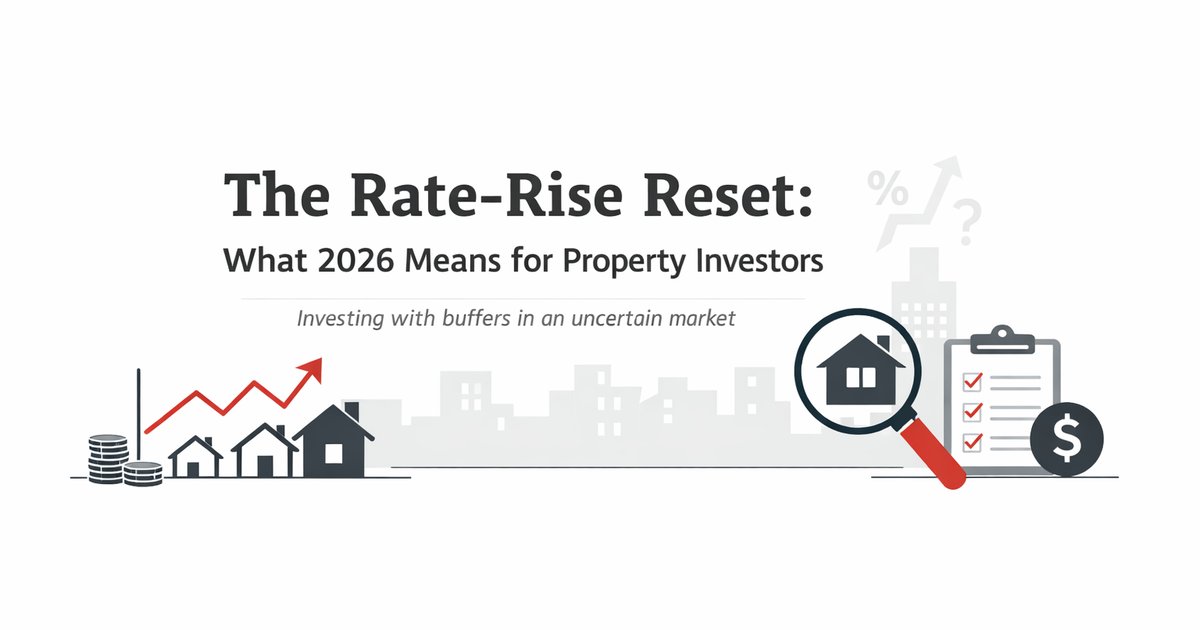The property market, with its cyclical nature and potential for significant returns, often tempts investors to rely on market predictions in their decision-making process. These forecasts, while sometimes grounded in thorough analysis, carry inherent risks due to their speculative nature and the multitude of unpredictable factors influencing the real estate market. The allure of "getting in early" or "outsmarting" market downturns can be strong, but the stakes are high. Misplaced trust in uncertain predictions can lead to decisions that may not align with long-term investment goals or the realities of market dynamics.
In contrast, strategic, informed investing offers a more stable foundation for navigating the property market. This approach emphasizes thorough research, a deep understanding of market fundamentals, and a commitment to making decisions based on current data rather than speculative forecasts. By focusing on informed investing, individuals can develop a robust investment strategy that withstands market volatility and capitalizes on genuine opportunities for growth. This introduction sets the stage for exploring why and how investors should consider moving beyond the dangerous game of property predictions to a more analytical and grounded methodology.
The Drawbacks of Relying on Market Predictions
Relying heavily on market predictions when making property investment decisions can be fraught with challenges and risks. While forecasts can provide a glimpse into potential future trends, they are not without their significant drawbacks, which can impact the success and sustainability of investment strategies.
Unpredictability and Volatility
Market predictions are inherently uncertain due to the complex interplay of global economic factors, local market dynamics, government policies, and unforeseen events such as natural disasters or political upheaval. This unpredictability can render even the most well-reasoned forecasts obsolete overnight, leading investors astray.
The Risk of Misinformation
Predictions often vary widely among experts, with different analysts offering contrasting outlooks based on the same set of data. This discrepancy can stem from differing methodologies, biases, or interpretations, leading to confusion and potentially misleading investors about the true state of the market.
Overreliance on Speculative Trends
Investors who focus too heavily on predictions might base their strategies on speculative trends rather than solid fundamentals. This overreliance can divert attention from the core principles of property investment, such as location quality, property condition, and tenant demand, potentially resulting in poor investment choices.
Emotional Decision-Making
Predictions, especially those promising high returns or highlighting market booms, can fuel emotional decision-making. This might lead investors to make hasty, ill-considered purchases driven by the fear of missing out (FOMO) or to sell properties prematurely in a panic during predicted downturns.
Opportunity Cost
By waiting for predicted market conditions to materialize, investors might miss out on solid, tangible opportunities available in the present. The opportunity cost of such delays can be significant, potentially hindering portfolio growth and diversification.
Understanding these drawbacks is crucial for investors aiming to navigate the property market effectively. It underscores the importance of adopting a more nuanced, research-driven approach to property investment, one that prioritizes empirical evidence and sound investment principles over the uncertain game of market predictions.
Unpredictability and Volatility
The real estate market is a complex system influenced by a myriad of factors, both macroeconomic and microeconomic, making its dynamics highly unpredictable and volatile. This unpredictability stems from several key elements that can dramatically shift market conditions, often without warning.
-
Global Economic Fluctuations: International economic trends, such as changes in trade policies, currency valuation shifts, and global financial crises, can have immediate and profound effects on local property markets. These global forces can alter investor confidence and demand, affecting property values and investment returns unpredictably.
-
Interest Rate Changes: Central banks' adjustments to interest rates directly impact mortgage rates, influencing both the affordability of property financing and the attractiveness of real estate as an investment class. An unexpected rise or fall in interest rates can significantly alter investment calculations overnight.
-
Government Policies and Regulations: New laws, tax changes, zoning adjustments, and housing policies can rapidly transform the investment landscape. For example, incentives for first-time homebuyers can increase demand, whereas tighter lending criteria can reduce it, each affecting property values in unforeseeable ways.
-
Technological Advances: The advent of new technologies can shift where people choose to live and work, thus affecting property demand in certain areas. The rise of remote work, for instance, has altered the desirability of city properties versus suburban or rural properties.
-
Societal Changes: Shifts in demographics, population movements, and changing societal preferences, such as the growing desire for sustainable living, can unpredictably impact demand for certain types of properties or locations.
-
Natural Disasters and Pandemics: Unforeseen events like earthquakes, floods, or global health crises can have immediate and unpredictable effects on property markets, from damaging property to changing population mobility and economic activity patterns.
These factors highlight the inherent unpredictability and volatility of the property market. They underscore the challenges of relying on market predictions for investment decisions, as the conditions upon which forecasts are based can change rapidly and without warning, often rendering predictions obsolete.
The Risk of Misinformation
The property market, like any financial market, is susceptible to misinformation, particularly when predictions are based on incomplete or biased data. This misinformation can mislead investors, skewing their perception of market conditions and leading to poorly informed investment decisions.
-
Incomplete Data Analysis: Often, predictions are made without a comprehensive view of the market. Analysts might focus on a subset of data that supports a particular trend, ignoring counterindications or broader economic indicators that could suggest a different outcome. This selective analysis can paint an overly optimistic or pessimistic picture of the market’s future direction.
-
Overreliance on Historical Trends: While historical data is a valuable tool for understanding market cycles, relying solely on past trends to predict future movements can be misleading. Market conditions evolve due to new variables that were not present in the past, making it risky to assume that what happened before will happen again under different circumstances.
-
Biased Interpretations: Predictions can also be tainted by the personal biases of those making them. Financial institutions, for instance, may issue overly positive forecasts for the property market if they stand to gain from increased investment activity. Similarly, individual analysts may let their personal investment preferences or experiences unduly influence their market outlooks.
-
Echo Chambers: The proliferation of digital media has facilitated the creation of echo chambers, where a single prediction can be amplified without adequate scrutiny. This repetition can create a false sense of consensus or accuracy, leading investors to accept predictions at face value without seeking diverse viewpoints or verifying the underlying data.
-
Sensationalism: Sometimes, forecasts are sensationalized to capture attention, with bold claims about market booms or busts. These sensational predictions can spread rapidly, influencing investor sentiment and behaviour despite lacking a solid factual basis.
Recognizing the risk of misinformation requires investors to critically evaluate market predictions, seeking out diverse sources of information and considering the data and methodology behind forecasts. It underscores the importance of grounding investment strategies in a balanced assessment of available information rather than relying on speculative predictions that may be based on incomplete or biased data.
Strategies for Informed Property Investing
Informed property investing transcends mere speculation, grounding decisions in solid research, comprehensive market understanding, and strategic planning. Here are key strategies to enhance your investment approach, ensuring it is informed, balanced, and poised for long-term success.
Comprehensive Market Research
Engaging in thorough market research is the cornerstone of informed property investing. This involves analyzing current market trends, understanding economic indicators, and keeping abreast of political and regulatory changes that could impact the real estate landscape. It's about looking beyond surface-level data to grasp the underlying forces shaping property values and rental demand.
- Data-Driven Decisions: Utilize a variety of sources, including real estate databases, government reports, and financial news, to gather data. Analyze this information to identify patterns, risks, and opportunities.
- Local and National Insights: Balance local market knowledge with an understanding of national trends. How do national economic conditions affect your local area? Are there specific local developments that could influence property values?
Understanding Local Market Dynamics
The local market dynamics can significantly differ even within the same city or region. An informed investor understands these nuances, recognizing that each area has its unique demand drivers, challenges, and growth potential.
- Demographic Trends: Study the demographic shifts within your target area. Are young families moving in, indicating a demand for larger homes and proximity to schools? Or is there a trend toward single occupancy, suggesting a higher demand for apartments?
- Supply and Demand Balance: Assess the current supply and demand in the area. An oversupply of properties can lead to lower rental yields, while high demand in an area with limited supply can drive up rental and property values.
- Future Development Plans: Stay informed about planned infrastructure or commercial developments, as these can significantly impact property desirability and value in the area.
Leveraging Technology for Data Analysis
Technology offers powerful tools for investors to analyze property markets more efficiently and accurately. From comprehensive property databases to predictive analytics models, tech tools can provide deeper insights and forecast trends more reliably.
- Analytical Tools: Use property investment software and online platforms that offer analytical tools for assessing property values, rental yields, and market trends.
- Real-Time Data Access: Leverage platforms that provide real-time access to market data, allowing you to make timely decisions based on the latest information.
Professional Advice and Networking
While individual research is vital, consulting with professionals can offer additional insights and help validate your investment strategy. Networking with fellow investors can also open opportunities for partnerships and share valuable market intelligence.
- Consult with Experts: Engage real estate agents, property managers, and financial advisors who understand the local market. Their expertise can provide nuanced perspectives and advice tailored to your investment goals.
- Real Estate Networks: Join real estate investment groups, forums, and associations to connect with other investors. Sharing experiences and strategies can offer new insights and help you stay informed about broader market trends.
Adopting these strategies for informed property investing ensures that decisions are made with a comprehensive understanding of market conditions, supported by data, expert insights, and a clear alignment with your investment objectives.
Comprehensive Market Research
In the world of property investment, comprehensive market research is indispensable. It forms the bedrock of informed decision-making, enabling investors to navigate the complexities of the real estate market with confidence. The key to effective market research lies in the utilization of diverse sources and data, ensuring a holistic view of the investment landscape.
-
Diverse Data Sources: A robust market analysis incorporates information from a wide array of sources. This includes real estate market reports, economic forecasts, demographic studies, and government housing data. By synthesizing data from these varied sources, investors can gain a multifaceted understanding of market conditions.
-
Local and Global Insights: To fully comprehend the factors influencing property markets, it’s crucial to consider both local and global perspectives. Local market data provides insight into neighborhood-specific trends, while global economic indicators can shed light on broader factors affecting property investment, such as interest rates and international investment flows.
-
Historical vs. Current Data: Analyzing historical data helps in understanding long-term market trends and cycles, offering valuable context for current market conditions. However, it's equally important to stay updated with the most recent data to capture the market's current state and short-term fluctuations.
-
Qualitative and Quantitative Analysis: Effective market research combines quantitative data, such as price trends and rental yields, with qualitative insights, such as consumer sentiment and political climate. This blend allows for a more comprehensive market analysis, beyond mere numbers.
-
Technology and Tools: Leveraging advanced technology and analytical tools can significantly enhance the efficiency and depth of market research. From AI-driven market prediction models to GIS mapping for location analysis, technology offers powerful ways to analyze and interpret data.
The importance of comprehensive market research cannot be overstated. It empowers investors to make well-informed decisions, identify potential risks and opportunities, and devise strategies that are responsive to market realities. Ultimately, the depth and breadth of your market research can significantly influence the success of your property investment endeavors.
Understanding Local Market Dynamics
In property investment, the significance of understanding local market dynamics cannot be overstated. While broad market predictions provide a general outlook, the real value lies in local insights that account for the unique characteristics and trends of specific areas. This granular approach enables investors to make more informed decisions, tailored to the nuances of each market.
-
Micro-Market Variations: Even within the same city, property markets can vary dramatically from one neighborhood to another. Factors such as local economic growth, community amenities, and public transport accessibility can influence the desirability and value of properties in different ways. Recognizing these micro-market variations is crucial for identifying opportunities that broad predictions may overlook.
-
Local Economic Indicators: The health of the local economy, including employment rates, income levels, and business growth, can significantly impact property demand and prices. By focusing on these local economic indicators, investors can gauge the potential for rental and capital growth in specific areas.
-
Community and Demographic Trends: Understanding shifts in community composition and demographic trends, such as an influx of young professionals or families, can offer insights into future demand for different types of properties. This knowledge allows investors to anticipate changes in rental demand and property values.
-
Impact of Local Developments: Infrastructure projects, new commercial developments, and changes in zoning laws within a locality can have a profound impact on property markets. Keeping abreast of such developments provides investors with a competitive edge, enabling them to act on opportunities before they become widely recognized.
-
Local Government Policies: Policies and regulations implemented by local governments, such as tax incentives for developers or restrictions on short-term rentals, can influence investment viability. Investors who are well-informed about these policies can better navigate the regulatory landscape and align their strategies accordingly.
Emphasizing local insights over broad predictions allows investors to adopt a more strategic and responsive approach to property investment. By delving into the specifics of local market dynamics, investors can uncover hidden gems and mitigate risks associated with generalized market forecasts. This focus on local markets cultivates a deeper understanding and appreciation of the factors driving property values and rental demand, setting the stage for more targeted and successful investment decisions.
Tools and Resources for the Modern Investor
The landscape of property investment is continuously evolving, with technology playing a pivotal role in shaping how investors analyze markets and make decisions. Modern investors have a wealth of tools and resources at their disposal, significantly enhancing their ability to make informed, data-driven decisions.
Leveraging Technology for Data Analysis
Technology has revolutionized the way investors approach market analysis, offering sophisticated tools that provide deep insights and predictive analytics. Among these, AbodeFinder’s Suburb Finder and Buying Chance Calculator stand out as essential tools for the modern investor.
-
AbodeFinder’s Suburb Finder: This tool offers investors a comprehensive analysis of suburbs, providing key data points such as median property prices, rental yields, and demographic information. It enables investors to identify areas with high growth potential or uncover undervalued suburbs, making it easier to target investments that align with their strategy.
-
Buying Chance Calculator: Understanding the likelihood of securing a property within a specific budget and location is crucial. The Buying Chance Calculator evaluates your investment capacity against current market conditions, offering a realistic view of what you can afford and where you can afford it. This tool aids in refining investment searches and focusing efforts on achievable targets.
These technological tools empower investors to sift through vast amounts of data, transforming raw numbers into actionable insights. By leveraging these resources, investors can gain a competitive edge, identifying lucrative opportunities and making decisions based on comprehensive market analyses.
Professional Advice and Networking
While technology provides the data, human expertise adds a layer of interpretation and strategic thinking that is equally valuable. Seeking professional advice and engaging in investor networks can complement technological tools, offering nuanced insights and practical guidance.
-
Expert Consultations: Property Advisors, financial advisors, and market analysts possess in-depth knowledge and experience. Consulting with these professionals can provide clarity, validate data-driven insights, and help navigate complex market dynamics. Their advice can be instrumental in developing a robust investment strategy and avoiding common pitfalls.
-
Investor Networks: Participating in investor networks and forums facilitates the exchange of ideas, experiences, and strategies. These communities offer support, foster partnerships, and can provide early alerts on market trends and investment opportunities. Networking with fellow investors encourages continuous learning and opens doors to collaborative ventures.
Combining the power of technology with the expertise of professionals and the support of investor networks creates a comprehensive ecosystem for informed property investment. These tools and resources enable investors to navigate the complexities of the real estate market with confidence, optimizing their investment decisions for better outcomes.
Building a Future-Proof Investment Strategy
In the ever-changing landscape of property investment, building a strategy that withstands the test of time and market fluctuations is crucial. A future-proof investment strategy is not just about selecting the right properties today but ensuring your portfolio remains resilient and adaptive to future market changes.
Diversification and Flexibility
Diversification is a fundamental principle for mitigating risk and enhancing the potential for stable, long-term returns. Flexibility in your investment approach allows you to adjust as market conditions evolve.
- Asset Type Diversification: Spread your investments across different types of properties, such as residential, commercial, and industrial, to reduce dependency on the performance of a single market segment.
- Geographic Diversification: Investing in different regions or cities can protect your portfolio from localized economic downturns. It opens up opportunities for capitalizing on the growth in emerging markets.
- Financial Flexibility: Maintain a financial buffer and consider flexible financing options to navigate through market downturns without the need to liquidate assets prematurely.
- Adaptive Strategy: Be prepared to reevaluate and adjust your investment strategy based on new market data and trends. Flexibility to shift focus or rebalance your portfolio is key to seizing new opportunities.
Continuous Learning and Adaptation
The real estate market is influenced by numerous external factors, including economic cycles, regulatory changes, and technological advancements. Staying informed and ready to adapt your strategies is essential.
- Ongoing Education: Commit to continuous learning through courses, webinars, and reading industry publications. Staying informed about the latest market trends, investment strategies, and regulatory changes is crucial.
- Leverage Technology: Utilize technological tools for market analysis and investment management. Innovations in real estate technology can provide new ways to analyze data, manage properties, and connect with potential opportunities.
- Networking: Engage with a community of investors, professionals, and advisors. Exchanging insights and experiences with peers can offer fresh perspectives and alert you to emerging trends.
- Feedback Loop: Regularly review your investment performance and decisions. Analyzing what worked or didn’t work allows you to refine your approach and learn from both successes and challenges.
Building a future-proof investment strategy in property requires a blend of diversification, flexibility, continuous learning, and adaptation. By embracing these principles, investors can create a resilient portfolio poised for growth, regardless of market dynamics.
Conclusion
The journey through the nuanced terrain of property investment has underscored a critical caution: the reliance on property market predictions is fraught with uncertainty and risk. As we've explored, the allure of forecasting can often lead to decisions based on speculative and sometimes flawed data, overlooking the complex, multifaceted nature of real estate markets.
Key Takeaways:
- Market predictions are inherently uncertain, influenced by a myriad of unpredictable factors, from economic shifts to regulatory changes.
- Misinformation and the echo chamber effect can amplify the perceived accuracy of predictions, leading investors astray.
- A strategic approach grounded in comprehensive market research, understanding local dynamics, and leveraging reliable data and tools offers a more stable foundation for investment decisions.
As we navigate the unpredictable waves of the property market, the call is not for prophecy but for prudence. The emphasis should be on a more analytical and grounded approach to investment. This entails a deep dive into market research, embracing technology for data analysis, seeking professional advice, and building a diversified, flexible investment strategy that can adapt to change.
In the realm of property investment, wisdom lies not in predicting the future but in preparing for it through informed, strategic decisions. Let us shift our focus from the precarious game of predictions to the solid ground of research-based strategies. By doing so, we empower ourselves to build resilient, future-proof investment portfolios that can weather market volatilities and capitalize on genuine opportunities for growth.
Encourage a shift towards a more analytical, research-driven approach to property investment, where decisions are based on solid data, comprehensive analysis, and strategic foresight. This path, though requiring diligence and patience, paves the way for sustainable success in the dynamic world of real estate.
As we navigate the complexities of the property market, equipped with the insights and strategies discussed, the next step in your investment journey is clear. It's time to move beyond speculation and embrace the power of data-driven decision-making.
AbodeFinder offers a suite of tools and resources designed to empower investors like you. From the Suburb Finder that unveils the potential of different neighborhoods, to the Buying Chance Calculator that evaluates your investment opportunities, AbodeFinder is your partner in making informed, strategic property investment decisions.
- Explore AbodeFinder's Suburb Finder: Delve into detailed analytics and insights about various suburbs to identify those with the highest potential for growth and return on investment.
- Utilize the Buying Chance Calculator: Assess your buying power and discover where your investment could yield the best returns, based on real-time market data and trends.
- Stay Informed with AbodeFinder's Blog: Our regularly updated blog provides valuable market insights, investment tips, and the latest property trends to keep you ahead in the property investment game.
Don't leave your property investment success to chance. Equip yourself with the right tools and knowledge to make confident, informed decisions. Visit AbodeFinder today and take the first step towards a more strategic and profitable property investment journey.
Discover the future of property investment with AbodeFinder. Your journey to informed and successful investing starts here.


















